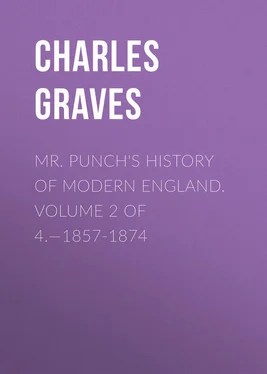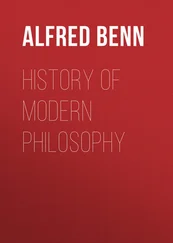Charles Graves - Mr. Punch's History of Modern England. Volume 2 of 4.—1857-1874
Здесь есть возможность читать онлайн «Charles Graves - Mr. Punch's History of Modern England. Volume 2 of 4.—1857-1874» — ознакомительный отрывок электронной книги совершенно бесплатно, а после прочтения отрывка купить полную версию. В некоторых случаях можно слушать аудио, скачать через торрент в формате fb2 и присутствует краткое содержание. ISBN: , Издательство: Иностранный паблик, Жанр: foreign_prose, foreign_humor, на английском языке. Описание произведения, (предисловие) а так же отзывы посетителей доступны на портале библиотеки ЛибКат.
- Название:Mr. Punch's History of Modern England. Volume 2 of 4.—1857-1874
- Автор:
- Издательство:Иностранный паблик
- Жанр:
- Год:неизвестен
- ISBN:http://www.gutenberg.org/ebooks/45003
- Рейтинг книги:4 / 5. Голосов: 1
-
Избранное:Добавить в избранное
- Отзывы:
-
Ваша оценка:
- 80
- 1
- 2
- 3
- 4
- 5
Mr. Punch's History of Modern England. Volume 2 of 4.—1857-1874: краткое содержание, описание и аннотация
Предлагаем к чтению аннотацию, описание, краткое содержание или предисловие (зависит от того, что написал сам автор книги «Mr. Punch's History of Modern England. Volume 2 of 4.—1857-1874»). Если вы не нашли необходимую информацию о книге — напишите в комментариях, мы постараемся отыскать её.
Mr. Punch's History of Modern England. Volume 2 of 4.—1857-1874 — читать онлайн ознакомительный отрывок
Ниже представлен текст книги, разбитый по страницам. Система сохранения места последней прочитанной страницы, позволяет с удобством читать онлайн бесплатно книгу «Mr. Punch's History of Modern England. Volume 2 of 4.—1857-1874», без необходимости каждый раз заново искать на чём Вы остановились. Поставьте закладку, и сможете в любой момент перейти на страницу, на которой закончили чтение.
Интервал:
Закладка:
The success of "Tom Brown" (Tom Hughes), who was elected for Lambeth in 1865, encouraged the enthusiastic friends of the British workman in the hope that he would now be painted without fear or favour, but Tom Brown's honest unvarnished portraiture was more than his sitter could stand: —
While a fact is a fact 'twill do no good to blink it,
Put up with the shadows Tom Brown dares to show,
Your face may be darker than you like to think it,
If the shadows ain't fast, wash, and let's see them go.
While your Union pickets still waylay and "ratten"
The knob-sticks, who work on their own honest hook,
While on your hard earnings strike-delegates batten,
And machines and machine-work are in your black book;
While men who earn more by the week than their curate
Are content in one room of a hovel to pig;
While shop-drinks and Saint Monday their old rate endure at,
And the wife and the young 'uns come after the swig;
While limb's rest and soul's light to your infants begrudging,
You drive them to workshop, to mine, loom or wheel,
To drag through long years of unnatural drudging
As though minds could die out, and yet bodies not feel;
While such are the shadows your features that darken,
Needs must that the blacks in your picture appear;
And they're no friends who bid you your own praises hearken,
When an honest fault-finder is craving your ear!
Later on, however, Tom Brown was himself taken to task for flattering the working man.
On the question of housing and sanitation Punch refused to believe that landlords were altogether to blame. Social reformers and legislators found themselves up against stubborn facts, and none were more stubborn than the Briton's prejudices in favour of vested rights and a man's house being his own castle, wherein he is free to do what he likes with his own: —
These stubborn facts are, no doubt, at the bottom of much that is worthy of respect in John Bull's character. They have not a little to do with his Magna Charta and his Habeas Corpus. But they occasionally stop the way all the same; obstruct the efforts of the Local Board or Nuisance Removal Committee, crouch like lions in the path of the Officer of Health, trip up the heels of the Inspector of Nuisances, and crop out in back slums, by-lanes, and blind alleys for district visitors and zealous clergymen to break their shins over.
Village Sanitation in 1865
These remarks form the preface to a series of extracts from the verbatim report of a Visiting Committee appointed in 1865 to inspect a little seaside village. The name of the place is withheld, but Punch pledges his word for the absolute veracity of the reporter, adding that what the Committee found in the way of stinks, putrid wells, foul accumulations, and purblind or pig-headed people was to be found in nineteen out of every twenty English villages, seaside or inland, rural or suburban. The houses in a sample street were occupied by an old gardener, a small pork butcher, three pilots, three sailors' wives, and two coast-guardsmen. The description of the well in the pork butcher's house is enough, in Dickens's phrase, to sicken a scavenger. But the complacent fatalism which marked all these householders rises to a pitch of sublimity in the immortal phrase of the first coast-guardsman: -
"Had the cholera in '44: ain't afeared of it. Considers as it's a natural went for the overplush of mankind. When his time comes, knows as he 'as got to go. Considers as his time wasn't come in '44. Always keeps his house very clean: does all the scrubbing himself, and paints his bedsteads and chests of drawers with red lead and turps twice a year."
According to the local doctor, all the inhabitants of these houses were drinking water strongly impregnated with lead, but "they appear to like it so I can't help it, especially as the landlord refuses to alter the pumps." The first pilot considered that he had a right to drink his own sewage if he liked it. The second coast-guardsman "couldn't abear chloride of lime," and, in general, disinfectants were dreaded more than bad drains. An optimistic speaker on Social Science in October, 1859, had declared that the advance of education was certainly very marked. "Classes once illiterate now show a love of literature, the taste for which has even reached our cabmen, who in demeanour and civility are not the men they were." Punch was sceptical about the cabman and printed an ironical poem on his progress modelled on "She wore a wreath of roses." The passages we have quoted show that six years later pork butchers, pilots and coast-guardsmen left a good deal to be desired in their knowledge of practical hygiene. But Punch does not acquit the landlords or Government officials, and, though no lover of despotism abroad or at home, there were moments when he felt that a little more "paternal government" would not be a bad thing. As he put it a little later: "when Mr. Punch is reminded of tanks, cisterns, bins and butts for miles along a tainted shore being overlooked by a mythical Inspector of Nuisances instead of being looked into, in his utter bewilderment he is tempted to exclaim, Wanted a Bismarck."
With the death of Palmerston the question of organic reform re-emerged, but the Russell administration, hampered by the disaffected Adullamite Liberals – brilliantly led by Lowe – and restrained by Whig caution, handled their Bill in a half-hearted spirit which courted defeat. Russell resigned at the end of June, 1866, and was succeeded by Lord Derby with Disraeli again as Chancellor of the Exchequer. It is on record that Gladstone, shortly after Palmerston's death, agreed with Denison, the Speaker, that there was no strong feeling for reform in the country. Yet within a few months the diagnosis was completely falsified. Immediately after the fall of the Russell administration came the historic Hyde Park riots and a vigorous agitation throughout the country. "The artisans, who had seemed apathetic towards the franchise when it was dangled before them, became angry when it was refused." Punch's account of the rioting and its sequel is liberal of censure, but cannot be regarded as either impartial or judicial or as appreciative of the significance of the episode: —
Monday, July 23. – It did not seem to suit the Fates that our friends the Conservatives should slide into the recess quite so quietly as had been anticipated. Sir George Grey, the late Home Secretary, had ordained that the proposed Reform Demonstration should not be allowed to take place in Hyde Park, but his Ministry went out in time to save him any further trouble in the matter. Mr. Walpole had to vindicate the law, and his gentle soul has been a good deal perturbed by events. One Beales insisted on holding the meeting, and Sir Richard Mayne locked the Park Gates. The result was inevitable. The artisan class attended in large numbers, and of course behaved perfectly well; but, equally of course, the processions were supplemented by a vast mass of Roughs, who behaved perfectly ill. Mr. Punch is unable to compliment the Reform League, inasmuch as its acts tended to violate order, and its "experiment of right" could have been tried with a hundred men instead of with thousands. Nor can we compliment the authorities who endeavoured to defend an untenable post, inasmuch as law could have been asserted by the arrest of a few individuals. He does not make a great noise about the breaking down of some railings, and the destruction by some roughs of trees and shrubs, nor would he put London in a state of siege because a good many windows have been broken, but all this sort of thing is really the fault of one Beales, who knew that a mob would follow the working man. Rough and Bludgeon came largely into contact, to the discomfort of the former, and the Beaks looked to the rest, Mr. Knox having especially distinguished himself by firmness and moderation, coming down sternly on ruffians and being lenient to mere fools.
Читать дальшеИнтервал:
Закладка:
Похожие книги на «Mr. Punch's History of Modern England. Volume 2 of 4.—1857-1874»
Представляем Вашему вниманию похожие книги на «Mr. Punch's History of Modern England. Volume 2 of 4.—1857-1874» списком для выбора. Мы отобрали схожую по названию и смыслу литературу в надежде предоставить читателям больше вариантов отыскать новые, интересные, ещё непрочитанные произведения.
Обсуждение, отзывы о книге «Mr. Punch's History of Modern England. Volume 2 of 4.—1857-1874» и просто собственные мнения читателей. Оставьте ваши комментарии, напишите, что Вы думаете о произведении, его смысле или главных героях. Укажите что конкретно понравилось, а что нет, и почему Вы так считаете.












